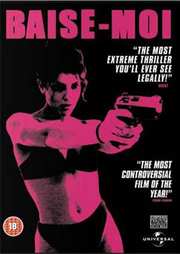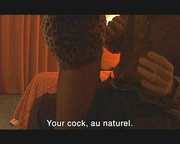Review of Baise Moi
Introduction
Notorious French art-house/exploitation cross-breed makes it to video under fairly dubious pretences, and uncut from its theatrical display for your viewing pleasure. ‘Baise-Moi’, which has been translated both as ‘f*** Me’ (close) and ‘Rape Me’ (distortive) for the European and British/American markets respectively utilizes both the conventions of the American road movie, the intellectual preoccupations of European art-house cinema and an aesthetic derived from imprecise punk-influences, to create its curious mix of horrific violence and female companionship. Manu (Raffaela Anderson) and Nadine (Karen Lancaume) are two beleaguered young women, jaded and indifferent with their current surroundings: Manu with her abusive boyfriend and Nadine by her anal flat-mate. After Manu is gang-raped and Nadine pushed too far by her roomy’s petty rants, they each dispatch their nemeses and eventually meet up to go on a frenzy of random murder, drinking, screwing and occasional heart-felt discussions about their status.

Video
Pretty terrible. The grainy haze of DV is hard to avoid given the visual style that has been applied (only natural lighting was used). This, combined with a deeply amateurish approach to both editing and composition leads to one ugly mother. Which, no doubt, is partly the point, but it doesn’t change the fact that this transfer stinks.

Audio
Similar to the audio, grittiness is amplified on the digital format, and apart from some deafening death-metal there’s little of interest.

Features
An interesting couple of documentaries, the first following the filmmakers and lead actors through the production and into the controversy, which lead to a ban and ultimately virtual censorship through the application of an X rating at French cinemas. Directors Coralie Trinh Thi and Virginie Despentes (who also wrote the book upon which the film is based) dismiss the ban as the product of reactionary right-wing paranoia of a revolutionary socialist discourse, and, as you might imagine, their self-indulgence, combined with noted reticence on actually discussing the meaning of the work, progressively becomes harder to swallow. This reticence about declaring meaning is amplified in a short Q&A after a British screening, where the two directors, admittedly non-native speakers, discuss the narrow-mindedness of the film’s critics whilst they fail themselves to make any substantial remarks about how the viewer is supposed to consume the film, given that they clearly think it has been so blatantly misinterpreted elsewhere. To complete the package we get some trailers for ‘Baise-Moi’, ‘Lantana’, ‘Lava’, ‘Lighthouse’, ‘Red Dragon’ and, somewhat self-deprecatingly on the part of distributors Universal, ‘Slap Her… She’s French’.

Conclusion
It’s debatable how relevant it is that both the lead actresses and one of its directors originated making porn films (Lancaume and Anderson as actors, Coralie Trinh Thi as a director) as it’s pretty difficult to see how any ordinary consumer of pornography could possibly get off on something like this, which, in its sordid crudeness, depicts the disgusting blandness of violence more clearly than most worthy projects on the subject. However, aesthetically, it’s pretty difficult to disentangle this from hard-core pornography, and that difference only becomes tangible with the film’s release on video, a kind of symbolic division by the BBFC that this is art, not porn. The filmmakers claim that since sexual gratification is not the sole intention of this film, it is not pornography. Whether or not this simply amounts to a use of the intentional fallacy is less significant than the product that we’re actually faced with, a garish, poorly made, awkwardly paced and really rather sentimental track through road movies cliches, with the relentless violence mostly as ineffectual as the stilted bonding between the two leads.
The leads however, do try and make the most of a bad situation, both Lancaume and Anderson using their admittedly limited abilities with some sensitivity if not much finesse. The deconstruction of all that constitutes femininity is not only less methodical than in Despentes original novel, but somewhat incomprehensible given the traditional feminine values bestowed by the plot: Manu and Nadine do foster a genuinely sensitive communion, although they seem too drunk, stupid and consumed with a hedonistic kill-crazy urge to realize it. That said, there’s no sense of tragedy or catharsis to the story, as it’s difficult to empathize with anyone in the scenario as no-one’s humanity is developed with any clarity.
If the incompetence of the filmmaking can be forgiven by both the green-ness of the filmmakers and the relatively experimental use of digital video (the film was made in 2000), its lack of any identifiable redeeming virtues makes it feel like a hollow, arrogant and futile gesture, so prevalent and regrettable now in French culture. The novelty of all this grungy, low-rent exploitation consumes any dormant intelligence or guiding philosophical interest, but not even that lasts: crudely shot murder gives way to another crudely shot murder, climaxing in a preposterous massacre at a sex bar. Ultimately, whatever its claimed intellectual proclamations, this still seems to be a film made by angry, self-absorbed, middle-class schoolgirls, filled with a numb, inarticulate rage, noisy, dull to the touch and ultimately almost totally inefficacious to anyone even reasonably attuned to the furious nothingness at its heart. An emptiness which can be greeted with a nervous laugh, an offended sneer, but most descriptively, a simple, tired sigh.

















































Your Opinions and Comments
Be the first to post a comment!